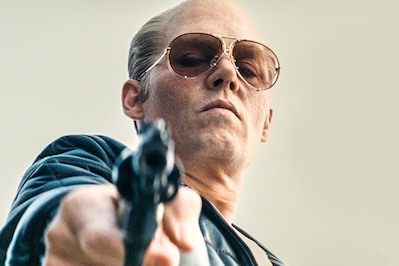A Flawed ‘Black Mass’: Tale of a Rat, as Told by Rats
Director Scott Cooper’s film about Boston gangster "Whitey" Bulger shines in its casting but is shaded by earlier works from Martin Scorsese and others. Johnny Depp as James "Whitey" Bulger in "Black Mass." (Cross Creek Pictures)
Johnny Depp as James "Whitey" Bulger in "Black Mass." (Cross Creek Pictures)
Let me tell you a story about Boston gangsters, gangster movies and movies about Boston gangsters. On Labor Day in 1961, a 25-year-old Bostonian named Alessandro Petricone Jr., nicknamed “Bobo,” was hanging out in a Boston bar with friends he had grown up with. Those friends were now members of the notorious Winter Hill Gang, though Petricone himself was not a gangster.
A man named Georgie McLaughlin—an associate of Winter Hill’s rival gang, the Charlestown crew—made a drunken pass at Petricone’s girlfriend and was immediately stomped by the Winter Hill coterie. In November of that year, McLaughlin turned up dead. Petricone and another man were questioned about the killing but released without charge. Petricone immediately quit town and wasn’t heard of in Beantown for another 10 years.
During that decade, Charlestown and Winter Hill conducted an epic, exceptionally violent power struggle, directly prompted by this drunken brawl, that piled up corpses and reconfigured the power structure of Boston’s criminal underworld, with Winter Hill coming out on top, led now by one Howie Winter — whose ambitious, gimlet-eyed underling, James “Whitey” Bulger, was waiting in the wings for his moment.
Meanwhile, no one gave another thought to Bobo Petricone until 1972 when, to the astonishment and delight of his former friends, he showed up on the big screen, under his new name, Alex Rocco, playing Moe Green in “The Godfather.” A year later, Bobo/Rocco was back in Boston for the first time in years to film the granddaddy of all Boston crime movies, Peter Yates’ “The Friends of Eddie Coyle.” Drawing on his erstwhile connections in South Boston’s gangland to add a little authenticity and local color to the movie, Rocco introduced the film’s star, Robert Mitchum, to Howie Winter, and also to a ruthless mob hitman named Johnny Martorano.
Later, Martorano confessed to having committed 20 contract killings, yet is free today to walk the streets of Boston, as the closing credits of Scott Cooper’s “Black Mass” inform us. He received immunity in exchange for his 2011 testimony against Bulger, who had been recently apprehended.
“Black Mass,” based on the electrifying true-crime book of the same name by Boston Globe crime reporters Dick Lehr and Gerard O’Neill, unfolds in this same criminal rat’s nest in the aftermath of that gang war. It opens on the night in 1975 when Boston FBI Agent John Connolly (Joel Edgerton), born and raised in South Boston—where the career options in those days for the neighborhood’s working-class Irish-American denizens were the Gillette plant, law enforcement or lawbreaking—meets secretly with Bulger (Johnny Depp), who has grown up in the same Southie project as Connolly. To Connolly, Bulger is both a distant friend and a sort of legend, idol and mentor.
During that meeting, Bulger agrees to break the ultimate Southie gangland taboo and become an informant for the FBI. That’s to say, to become a rat, although Bulger insists on using neutral terms like “strategist” and “adviser.” This comes not long after the first words in the movie, “I’m not a rat,” spoken by Bulger protégé Kevin Weeks (Jesse Plemons), as years later he unburdens himself in his turn to the FBI (because, as he reasons, “You can’t rat on a rat”). The testimony of Weeks and Martorano (W. Earl Brown) furnishes “Black Mass” with intertwined voice-overs to keep the viewer up to speed on the dark doings of Bulger and his crew of thugs and killers—it is a story about a rat, then, as told by other rats.
The rat looms large in the demonology of the Irish-American gangster, from Jimmy Cagney’s famed hatred for “dirty rats” to John Ford’s Gypo Nolan in “The Informer” to the actual rat that slinks along the balcony in front of the golden minaret of the Massachusetts Statehouse in the final shot of Martin Scorsese’s “The Departed” (the most John Waters-ish image in Scorsese’s filmography). Speaking of which, “The Departed” has largely sucked the available oxygen out of the Bulger story and seriously limits the narrative options available to the far less energetic and inventive Cooper. As a fictionalized, furiously kinetic and vitality-drunk fantasia about the Bulger saga, “The Departed” deploys an almost mathematically precise rendering of doppelgängers and mirror images and is in thrall to movies like “The Public Enemy” and Howard Hawks’ “Scarface: Shame of a Nation.” Jack Nicholson’s Frank Costello, plainly based on Bulger but a far more delectably rococo creation, has been joined in the years since by another baroque fictionalization of Bulger, James Woods’ venomous psychopath Patrick “Sully” Sullivan in Showtime’s “Ray Donovan.” This leaves Depp’s studiedly accurate rendering of Bulger as a johnny-come-lately to a crowded field. The works that have gone before “Black Mass” have left the film hobbled.
Cooper has elected to take the Eddie Coyle approach, borrowing Yates’ gritty, downbeat ’70s-style, semidocumentary approach rather than Scorsese’s dynamic flourishes. But the result is a kind of overarching pall of muddy glumness that slows the movie down without adding much in the way of grit or texture, or even period detail. And Cooper still wants to have his Scorsese cake and eat it, too: At least one of Depp’s big Oscar-buzz scenes—in which he extracts a “secret family recipe” from one of his knock-kneed FBI handlers, then scowlingly berates him for giving up the goods—is a kind of weak replay of Joe Pesci’s famous “What the fuck is so funny about me?” scene in “Goodfellas.”
As Weeks says early on, “In Southie, we went straight from playing cops and robbers in the playground to playing them for real in the streets. And in the streets, just like in the playground, it was hard to tell them apart.” Tell it to Cagney, whose role as an FBI agent in “G-Men” was scarcely distinguishable from his gangster Rocky Sullivan in “Angels With Dirty Faces.” The venomous turf-based tribal insularity and poisoned folk memory of Southie’s Irish population—they hate both “the Brits in the six counties and the wops in the North End”—forges bonds far tighter than any FBI oath of loyalty. Connolly feels a deeper, more instinctive fealty to Bulger than he does to his own superiors, a factor that soon enables Bulger to become the senior partner in their relationship, using Connolly to shut down investigations in order “to protect our high-echelon informant” and to bring about the downfall of his main rivals, the powerful Angiulo Mafia family in Boston’s North End.
Image is big with Whitey. He disports himself as a beneficent neighborhood bad-boy/overlord, sharply dressed, fit and trim in his 50s, always nice to old ladies with heavy shopping bags, keen to keep drugs off his streets, a reliable keeper of dark secrets, a gentleman around the ladies, a doting father and a good son to his elderly mother. All of which is bullshit (except for Mom).
Whitey floods Southie with heroin and cocaine; preys on local Irish-owned businesses, legitimate or not; murders at least two women by strangulation (only one is shown in the film); kills at least 11 other people by various methods; and oversees the grim work of Weeks and Martorano. And yeah, there’s the whole rat thing, of course. Johnny Depp has obviously taken great care to make his Whitey as authentic as possible, having consulted with Bulger’s lead attorney in preproduction (after failing to meet the man himself). With the aid of a lofted hairline, steel-blue eyes and a kind of murderous stillness that is eerily menacing and the polar opposite of Nicholson’s Costello, a Whitey has emerged here who frankly deserves a better film around him than the one Cooper has concocted. On the other hand, Depp is not an actor who works from the bone marrow on outward; far too many of his performances feel no deeper than a spray-on suntan, and despite the anchoring strength of his Whitey, at moments one might be forgiven for thinking, “Oh look, they took a Hunter S. Thompson base, ditched the cigarette holder and the hat, made some rug adjustments, froze the face, added contact lenses, and now all he’s got to do is scowl and say ‘Look at me’ a whole lot.”
Where “Black Mass” does triumph is in its casting, which is toothsomely perfect throughout, particularly in its faces. The cast is divided down the middle between criminals and FBI agents: the former, sleazy; the latter, clean-cut. The divided figure of John Connolly brings the haggard and doughy look of the other gangsters into the feds’ squeaky-clean realm. The gangsters, with the exception of Depp, all look terrible, hungover, exhausted, red-eyed, horribly dressed, often injured, always fat and bloated — apparently suffering from the undiagnosed post-traumatic stress disorder that comes in the end to all busy murderers. Jesse Plemons, the infanticidal choir boy of “Breaking Bad,” gave me great hope in the film’s opening shot, with his ravaged, drawn, bottomlessly hostile mien, a million secrets and regrets dancing evilly behind his eyes. Ditto Rory Cochrane as Steve “The Rifleman” Flemmi, Bulger’s weary main criminal partner, who has a pudgy, slack face denoting years of debauchery and horror, while Peter Sarsgaard, playing the mercurial murderer Brian Halloran, is frighteningly ill-looking and twitchy, nearly unrecognizable. Each is so perfectly cast and dressed that one wishes for more— a lot more—from each of them, but they are all badly underused by the film.On the other side of the law, we have a squadron of clean-shaven, well-dressed FBI agents played by square-jawed, bright-eyed, bushy-tailed nice-guy actors like Adam Scott and David Harbour, all of them ripe for corrupting by Whitey. Women fare poorly, as one might expect, in particular the one we don’t see at all; Sienna Miller’s role as Whitey’s last girlfriend Catherine Greig was excised from the movie entirely. Dakota Johnson plays Whitey’s common-law wife Lindsey Cyr, who is ruthlessly frozen out after their son dies of an allergic reaction to aspirin. And then there is pitiful Deborah Hussey (Juno Temple), daughter of Flemmi’s common-law wife, sexually molested by Flemmi as a child, then brutally murdered by him and Bulger because she is seen as a loose-lipped, unpredictable danger to their criminal empire. (“You fuckin’ tidy this up,” Whitey says after her murder. “I’m takin’ a nap.”) However, Julianne Nicholson, one of the finest actresses alive, plays Connolly’s long-suffering wife, Marianne, with a mixture of ballsiness, charm and, finally, a broken-down weariness at having her dinner table repeatedly invaded by the psychopathic Southie sleazebags who now control her husband’s mind.
What is so disappointing about “Black Mass” is its sheer timorousness in the face of other, frankly, better and more daring approaches to this material, and the filmmakers’ apparent reluctance to make choices that will set this rendering firmly apart from them. Considering the raw vitality of the horrifying source material, you have to wonder how it got diluted down into something this pale and weak. Further, considering the bang-up job done in the casting here and the evident eagerness of the performers to give it everything they had—nearly everyone here distinguishes him- or herself, but only in frustratingly brief bursts—the fault must lie in the hands of director Cooper and his writers.
I shall be washing “Black Mass” from my consciousness with a fifth viewing of “The Friends of Eddie Coyle,” and an umpteenth visit to “The Departed.” I counsel others to do the same. Long live the rat!
John Patterson writes about movies and Hollywood for The Guardian. Born in Northern Ireland, he has lived in Los Angeles since 1991.
Your support matters…Independent journalism is under threat and overshadowed by heavily funded mainstream media.
You can help level the playing field. Become a member.
Your tax-deductible contribution keeps us digging beneath the headlines to give you thought-provoking, investigative reporting and analysis that unearths what's really happening- without compromise.
Give today to support our courageous, independent journalists.





You need to be a supporter to comment.
There are currently no responses to this article.
Be the first to respond.